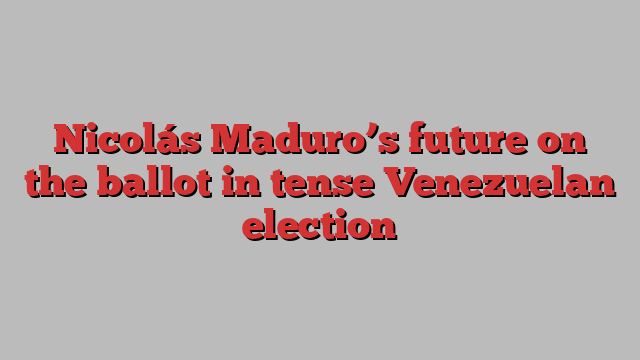
Unlock the Editor’s Digest for free
Roula Khalaf, Editor of the FT, selects her favourite stories in this weekly newsletter.
Venezuelans vote on Sunday in a presidential election in which authoritarian leader Nicolás Maduro is pulling out all stops to remain in power and the opposition senses its best chance to end 25 years of Cuban-backed revolutionary socialism.
Tensions have risen ahead of the vote, the outcome of which is highly uncertain. Independent opinion polls gave the main opposition candidate Edmundo González a lead of 20 to 30 percentage points, but many Venezuelans fear the government may refuse to recognise an opposition victory.
Both sides have painted the election as a turning point for Venezuela, a once-wealthy oil-exporting nation whose economy has collapsed over the past decade due to government mismanagement and tight US sanctions, triggering the exodus of a quarter of the population and the biggest migration crisis in the Americas.
Washington has called for a clean election and suggested that sanctions could be lifted if the election’s conduct is acceptable, while Maduro’s allies Russia, Iran and Cuba are hoping for a continuation of the status quo.
“This is a choice for Venezuelans to make, but the Venezuelan people deserve an election that genuinely reflects their will, free from any manipulation,” US secretary of state Antony Blinken said at a press conference in Tokyo on Sunday.
Maduro has threatened a “bloodbath” should the opposition win. He has painted Maríá Corina Machado, the main opposition leader, as a dangerous fascist and called González a “coward” and a “puppet of the extreme right”.
González, a 74-year-old retired diplomat, is running in place of Machado, who won an opposition primary in October but was banned from standing by the government-controlled Supreme Court in January.
“We’ve already beaten the regime morally, spiritually, and on the streets,” Machado told the Financial Times in her office in eastern Caracas before the election. “We’ve beaten the regime politically, now we just need to ratify it.”
Maduro’s government has taken numerous steps to hamper the opposition campaign, including arresting dozens of activists and aides, shutting down restaurants and hotels that serve Machado and González and ordering broadcasters not to mention Machado’s name.
Polls open on Sunday at 6am local time (10:00 GMT) and will close at 6pm, with the first results from the government-controlled National Electoral Council (CNE) expected around 10pm.
Queues formed outside some polling stations around the country overnight as people waited to vote. Shortly after polls opened, Maduro and his wife Cilia Flores cast their votes in Caracas, both wearing tracksuits emblazoned with the Venezuelan flag.
“The day has come, and it came in peace,” Maduro told gathered reporters. “I recognise and will recognise the electoral referee, the official announcements and I will make sure they are recognised.”
Some 21.4mn Venezuelans are eligible to vote, but only 69,000 of the roughly 4mn eligible who live abroad — and are among the most likely to vote for the opposition — were able to register.
Machado has run an insurgent campaign on social media and travelled across the country by car, turning out huge crowds despite not appearing on state-controlled television broadcasts or on billboards nationwide.
Maduro’s 2018 re-election was regarded by many countries in the west as fraudulent, leading Washington, Canada and the EU to sanction him and his inner circle. The Trump administration also imposed sweeping economic sanctions on Caracas.
“The US is prepared to calibrate our sanctions policy vis-à-vis events as they may unfold in Venezuela,” a US official told reporters on Friday. Washington also warned Venezuela’s military not to interfere and “put its thumb on the scale”.
Amid concerns that Maduro may attempt to manipulate the count or impede access to voting stations, the opposition is running a parallel count and has signed up about 100,000 witnesses to monitor the election. International observers will be largely absent after the government rescinded an invitation to the EU to monitor the election in May. The Organisation of American States was not invited.
The Carter Center, a US non-profit, has dispatched a small team to observe, and four monitors from the UN will provide a private report to UN secretary general António Guterres.
Worried that the government could cut power and internet access on Sunday, Machado and González will watch the results from a room in Machado’s party headquarters, replete with a diesel-powered generator and Starlink, an internet service owned by Elon Musk that uses satellites outside government control.
A group of conservative Latin American ex-presidents was taken off the plane in Panama en route to Caracas on Friday, after Venezuela said it would not allow them to enter.
“We are witnessing the last flutters of a dying regime,” said Bolivian former president Jorge Quiroga.